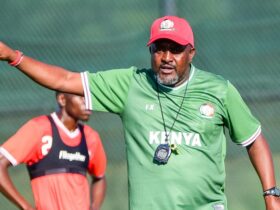The Harambee Stars’ campaign for the 2025 Africa Cup of Nations (AFCON) qualification ended on a somber note following a 1-1 draw against Zimbabwe on November 15, 2024. With just five points from their Group J matches, Kenya’s dream of a return to the continental stage was dashed, finishing third behind Cameroon and Zimbabwe. The result has sparked debates about the team’s shortcomings, Engin Firat’s leadership, and the broader state of Kenyan football.
A Predictable Outcome?
In the buildup to the crucial match at Peter Mokaba Stadium, coach Engin Firat acknowledged the challenge posed by Zimbabwe’s defensive strategy and reliance on counterattacks. True to his prediction, Zimbabwe’s Tawanda Maswanhise capitalized on a Kenyan defensive lapse to put his side ahead, despite Kenya dominating possession. Jonah Ayunga’s equalizer, his first goal for the national team, briefly reignited hope, but the Stars couldn’t muster a winning goal.
“The game played out as we expected,” Firat remarked post-match. “Both sides gave a big fight, but failing to utilize chances and dealing with injuries, like Joseph Okumu’s, defined our night.”
The Persistent Goal-Scoring Problem
Kenya’s inability to convert opportunities has been a recurring theme in recent campaigns. Despite creating chances through set-pieces and crosses, the team struggled to find the back of the net. Captain Michael Olunga and Jonah Ayunga, playing as dual strikers, were tightly marked, and Firat’s strategy of delivering aerial balls into the box fell short.
“It’s clear that we have a goal-scoring problem,” Firat admitted. “We need to address it if we’re to compete at a higher level. I wish we had solved this earlier, but we couldn’t.”
This inefficiency proved costly, as missed chances from players like Ronney Onyango left the team vulnerable to counterattacks. Zimbabwe’s disciplined defense and swift transitions exposed Kenya’s frailty, highlighting a need for tactical evolution.
Fans’ Frustration and Firat’s Blunt Response
Unsurprisingly, the result drew sharp criticism from fans, many of whom expected Firat to deliver on his earlier promises. In November 2023, the Turkish tactician had confidently stated that qualifying for AFCON 2025 was “non-negotiable.” However, his recent remarks painted a starkly different picture.
“I can understand the frustration back home,” Firat said. “We wanted to qualify, but we must realize our limitations and stop dreaming. Our record in this tournament says it all.”
These comments, while brutally honest, have further polarized opinions on Firat’s tenure, with some defending his pragmatic outlook and others calling for his resignation.
Tactical Inconsistencies and Selection Dilemmas
Throughout the qualifiers, Firat’s ever-changing lineups raised eyebrows. Against Zimbabwe, he made several notable changes, including dropping John Avire and Duke Abuya despite their strong performances in the previous match against Cameroon. Injuries to key players like Richard Odada compounded the issue, forcing Firat to shuffle his squad frequently.
This inconsistency, coupled with questionable tactical decisions, left the team struggling for cohesion. Firat’s decision to adopt a more direct style against Zimbabwe did not yield the desired results, further fueling criticism of his approach.His selection of starting 7 defenders in a match that was a must win for Kenya raised eyebrows with many football pundits and Ex International questioning that decision
Engin Firat’s Broken Promise
Firat’s initial optimism about Kenya’s AFCON prospects now seems overly ambitious. Beyond failing to qualify, his earlier goal of reaching the tournament’s knockout stages appears distant. The Harambee Stars have only made six AFCON appearances, none of which have seen them advance beyond the group stage.
“Things on the outside can always change,” Firat said, “but we must ask ourselves: with what resources can we achieve our goals? We need a reality check.”
What Lies Ahead For Kenya
With AFCON 2025 out of reach, Kenya’s focus now shifts to the 2026 World Cup qualifiers and preparations for co-hosting AFCON 2027. Firat has acknowledged the challenges ahead but remains under pressure to deliver tangible progress.
Critics argue that Kenya’s failure to qualify reflects deeper structural issues in its football setup, from inadequate grassroots development to inconsistent funding. These problems, they contend, cannot be solved by coaching changes alone.
Lessons picked
1. Mental Fortitude Under Pressure:
Kenya’s inability to perform in high-stakes matches, such as the do-or-die clash against Zimbabwe, highlights a lack of mental toughness.
2. Goal-Scoring Crisis:
Addressing Kenya’s finishing woes will require both tactical adjustments and the emergence of clinical forwards.
3. Defensive Vulnerabilities:
Zimbabwe’s counterattacks exposed Kenya’s defensive fragility, underscoring the need for better organization.
4. Tactical Clarity:
Firat’s rotating lineups and inconsistent strategies have drawn criticism, raising questions about his long-term vision.
5. Fan Disillusionment:
The gap between expectations and reality has left supporters questioning the team’s direction.
Kenya’s AFCON 2025 campaign was a tale of missed opportunities and unmet expectations. While Engin Firat’s leadership has come under scrutiny, the team’s struggles point to broader challenges that require a unified approach from players, coaches, and administrators. As the Harambee Stars look to rebuild, the question remains: can they break free from their cycle of underachievement and rise to the occasion? The road ahead will undoubtedly test their resilience and resolve.









![Francis Kimanzi[Harambee Stars Head Coach]](https://mafans.co.ke/wp-content/uploads/2024/12/Francis-Kimanzi-Kenya-280x210.webp)

Leave a Reply